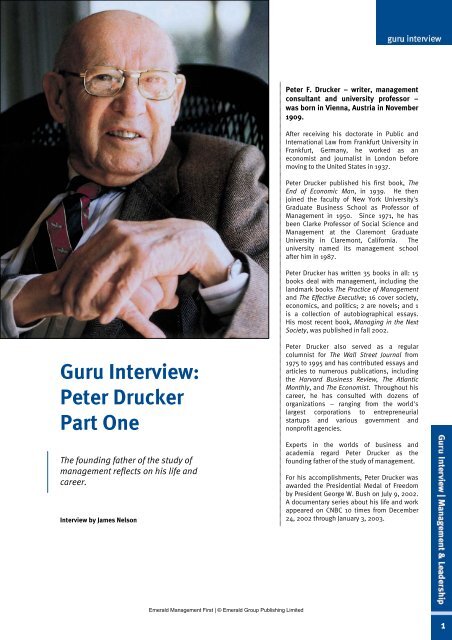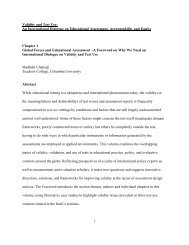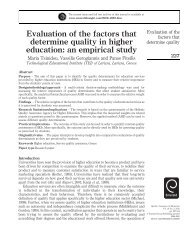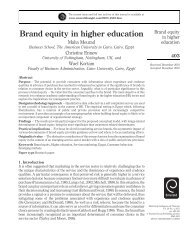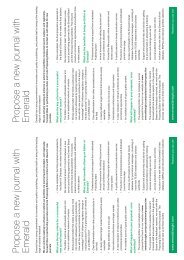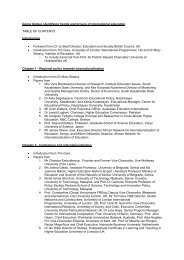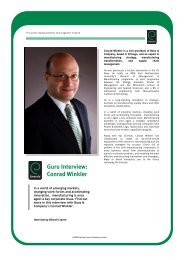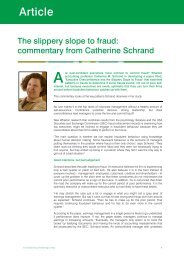Guru Interview: Peter Drucker Part One - Emerald
Guru Interview: Peter Drucker Part One - Emerald
Guru Interview: Peter Drucker Part One - Emerald
- No tags were found...
Create successful ePaper yourself
Turn your PDF publications into a flip-book with our unique Google optimized e-Paper software.
<strong>Peter</strong> F. <strong>Drucker</strong> – writer, managementconsultant and university professor –was born in Vienna, Austria in November1909.After receiving his doctorate in Public andInternational Law from Frankfurt University inFrankfurt, Germany, he worked as aneconomist and journalist in London beforemoving to the United States in 1937.<strong>Peter</strong> <strong>Drucker</strong> published his first book, TheEnd of Economic Man, in 1939. He thenjoined the faculty of New York University'sGraduate Business School as Professor ofManagement in 1950. Since 1971, he hasbeen Clarke Professor of Social Science andManagement at the Claremont GraduateUniversity in Claremont, California. Theuniversity named its management schoolafter him in 1987.<strong>Peter</strong> <strong>Drucker</strong> has written 35 books in all: 15books deal with management, including thelandmark books The Practice of Managementand The Effective Executive; 16 cover society,economics, and politics; 2 are novels; and 1is a collection of autobiographical essays.His most recent book, Managing in the NextSociety, was published in fall 2002.<strong>Guru</strong> <strong>Interview</strong>:<strong>Peter</strong> <strong>Drucker</strong><strong>Part</strong> <strong>One</strong>The founding father of the study ofmanagement reflects on his life andcareer.<strong>Interview</strong> by James Nelson<strong>Peter</strong> <strong>Drucker</strong> also served as a regularcolumnist for The Wall Street Journal from1975 to 1995 and has contributed essays andarticles to numerous publications, includingthe Harvard Business Review, The AtlanticMonthly, and The Economist. Throughout hiscareer, he has consulted with dozens oforganizations – ranging from the world'slargest corporations to entrepreneurialstartups and various government andnonprofit agencies.Experts in the worlds of business andacademia regard <strong>Peter</strong> <strong>Drucker</strong> as thefounding father of the study of management.For his accomplishments, <strong>Peter</strong> <strong>Drucker</strong> wasawarded the Presidential Medal of Freedomby President George W. Bush on July 9, 2002.A documentary series about his life and workappeared on CNBC 10 times from December24, 2002 through January 3, 2003.<strong>Emerald</strong> Management First | © <strong>Emerald</strong> Group Publishing Limited1
It is a mistake to say that business schools arecharged with educating leaders. They are chargedwith educating competent mediocrities to docompetent work. That's also true of medicalschools. They are not charged with educatingleaders but physicians who don't kill too manypeople. That's true of law schools. They arecharged with educating people who can draft adecent will, not with producing legal leaders. Youcan't educate leaders, well, you can in the sensethat leaders need to know a lot. But the purposeof professional schools is to educate competentmediocrities in large numbers. And that is whatwe are doing. Whether we are doing it well or not,I do not know. That's another matter.In an era of organizations, when society isstructured by so many organizations, how canwe get sufficient numbers of very competentmanagers, or very competent leaders?<strong>Peter</strong> <strong>Drucker</strong>:Look, that question was answered 350 years agowith the reorganization of the medical schools in16th century – early 17th century – Holland andScotland. You have to give people toolcompetence, and you have to set standards, andyou have to get across what are the keyquestions. So you don't start, as the medievalmedical school did, by asking the question, howdo we teach medical leaders? You start by askinghow do you teach ordinary people to do aconscientious diagnosis. What questions mustthey ask? What records must they keep? Whatfeedback do they need? And you ask pretty muchthe same sort of questions in managementschools. What are results, and what needs to bedone, and what are the priorities, and who has tounderstand what we are trying to do? Thequestions are 350 years old. They are no differentin any profession. They are what distinguish aprofession. And perhaps not everybody can learnit. But pretty much everybody can learn it if he orshe works hard enough.“Let me say bluntly, I don’tbelieve in leaders. All thetalk about leaders isdangerous nonsense. It is acopout. Forget about it.”Let me say bluntly, I don’t believe in leaders. Allthe talk about leaders is dangerous nonsense. Itis a copout. Forget about it. And I am veryunhappy that after the 20th century, with Hitler,Stalin and Mao as the great leaders, maybe thegreatest leaders in hundreds of years, I'm veryunhappy that anybody wants leaders with thoseexamples of mis-leaders so fresh. We should bevery much afraid of leaders. We should ask, whatdo they stand for? What are their values? Can wetrust them? Not “do they have charisma?” We'vehad too much charisma the last 100 years.If you are so sceptical of high-charismaticleadership, what do you think of the recent era ofhigh-profile CEOs we have just gone through?And, for that matter, the super-sizedcompensation of American executives?<strong>Peter</strong> <strong>Drucker</strong>:I am old enough to remember Franklin DelanoRoosevelt and Harry Truman, and while Rooseveltwas a great leader, Truman was the bestPresident the United States has had, and the onewho accomplished the most. He was not a highprofileleader, on the contrary. Everybodyunderrated him, including himself. So I have verylittle use for the superman CEO.As for the high salaries, I think they are a scandal.J. P. Morgan, who was not averse to money, saidin 1906 that any organization, any company inwhich the top people got more than 20 timeswhat the average people got is mismanaged. Herefused to invest in it. That is still a good rule,and by that rule I wouldn't invest in a great manyof our companies. By the way, the CEOs I haveknown – and I have known quite a few – did notsee themselves as supermen. They built a team.They were team leaders.You have just talked about leadership indisparaging terms and coupled it with referencesto Mao, Hitler and Stalin. It's been said that yousee management itself as a kind of bulwarkagainst fascism. Is that accurate? And how doesit fill that function?<strong>Peter</strong> <strong>Drucker</strong>:I don't see management as a bulwark. I see thefunctioning organizations in a society as abulwark. And they depend on management astheir organ. The present tendency is to look atmanagement as if it were something by itself.Nonsense. Management exists for the sake of anorganization. It is the servant of the organization.And any management that forgets that is a mismanagement.What are the consequences if managers ingeneral don’t see their role that way?<strong>Peter</strong> <strong>Drucker</strong>:Well, your organization is apt to go down prettyfast. And what are the consequences of mis-<strong>Emerald</strong> Management First | © <strong>Emerald</strong> Group Publishing Limited3
leadership in any organization? To destroy themorale of the organization. Managers andadministrators are servants, and the momentthey forget that they do damage. □<strong>Emerald</strong> Management First | © <strong>Emerald</strong> Group Publishing Limited4
Can we look upon nations as leaders, and if so,how do you assess America's current leadershiprole in the world?<strong>Peter</strong> <strong>Drucker</strong>:Now, I don’t think you have the next 30 days todiscuss that question. As to America's role in theworld, fortunately, we are no longer dominant.We are still militarily dominant, but not politicallyor economically, thank God. It is very dangerousto be the superstar. With China and India and theEuropean Union emerging, we are fast becomingjust another great power. And that will be hard toswallow, especially as we have 30 years ofdelusions of grandeur. Not because we werestrong but because others were so weak. And aworld economy is emerging in which we are noteven the foremost power. That's probably theEuropean Economic Union. And we will have tolearn to be one of – make it half a dozen – majorplayers. And America's role in the world willincreasingly be one of equals. America is notgoing to be the big bully and the big boss, as weare discovering in Iraq – the total disaster of Iraq– where we are creating only more turmoil.America's great strength was that it stood forvalues, not just power.In 2002, President George W. Bush awarded youthe National Medal of Freedom, a very highhonour. You spoke earlier of Presidents Trumanand Roosevelt and their competencies. Howwould you assess George W. Bush, graduate ofthe Harvard Business School, as a nationalleader?<strong>Peter</strong> <strong>Drucker</strong>:I'm sorry, I never answer questions about politics.<strong>One</strong> assesses a president 20 years after he hasdisappeared. We are just now beginning tounderstand Harry Truman, and he is emerging asa very great president. And I don’t think the timehas come yet, when we are even able to assessthis president’s father.Over 30 years ago you coined the term“knowledge worker”, and now knowledgeworkers abound. What are the particularchallenges of managing these specialists?<strong>Peter</strong> <strong>Drucker</strong>:I have been wrestling with that question for 30years. How do you make a knowledge workerproductive? Knowledge by definition is highlyspecialized. Nobody is very good at knowingmany things. Let me say, a journalist – and I'm anold one – is very good at being able to grasp theessence of other people's knowledge andprojecting it. But that doesn't mean they knowanything about psychology – they know how towrite about it and how to make it accessible tothe laity. Knowledge is exceedingly specialized.And so knowledge workers have to be managedbecause, by itself, a specialty is not productive.It’s got to be integrated with the knowledge ofothers, integrated into a team of knowledgeworkers.The second thing is that knowledge workers arebasically, I wouldn't say loners, but soloists. Andto make them effective you have to be theirprotector, their eyes and ears, but also theirtongue. And finally, as a rule they don't want tobe managers. Good knowledge workers want tokeep working in their specialities. That is a verytough challenge, especially when the publicprestige and the pay goes to managers, and thus,you have to develop the career ladder for theprofessional specialist.In 1993, you wrote a book called The Post-Capitalist Society. Can you explain what thatterm means – and when, if ever, will we arrive atit?<strong>Peter</strong> <strong>Drucker</strong>:We are already in the Post Capitalist Society, verymuch so. We have moved into the informationsociety. Nothing is easier than to get moneytoday, if you have the right information. It used tobe the other way round. Anybody with a PC, andtoday that means everybody in the developedcountries, has direct access to all the informationin the world, and is beginning to learn to use it.Not my generation, I'm 95. But my grandson's. Inthis knowledge society you compete not byhaving money but by making knowledgeproductive. And we in America, so far, have beenahead in this. But not for very long.You have always expressed great confidence infree markets, but you have also expressedreservations about capitalism per se. With theadvent of the knowledge society, are yourconcerns about capitalism now irrelevant, or doyou still have reservations?<strong>Peter</strong> <strong>Drucker</strong>:Free markets have their severe limitations, butthey are infinitely better than any alternative,especially as they are pretty fast at selfcorrecting.When they make mistakes, and theymake plenty, they correct themselves. Aneconomy, a society, an organization arebalancing acts. Among the main jobs ofmanagement is to balance short-term results and<strong>Emerald</strong> Management First | © <strong>Emerald</strong> Group Publishing Limited2
long-term results, and market standing andinnovation, and so on. Management is a balancerand above all it's a balancer between thedifferent expectations of its constituents. And thefirst constituent is not the shareholder. The firstconstituent is the consumer. If you don't satisfythe consumer, there's nothing else you can do.Capitalism is always in danger of overbalancingtoward the shareholder. The job of leadership,whether in the political sense or in business, is torestore the balance as it is needed at the time.Because that changes. Experiment is the strengthof capitalism, and no other system has thatstrength because no other system is pluralist.Over the years you've written very scepticallyabout government. What are your views on thefuture of government, of government’s role in thePost-Capitalist Society?<strong>Peter</strong> <strong>Drucker</strong>:You know, one of the things one learns when onegets to be my age is not to predict. I'm scepticalof any institution that does not have severerestraints and limits on power. I'm sceptical ofpower. I'm an old conservative. Power withoutauthority is the ultimate political evil.“In this knowledge societyyou compete not by havingmoney but by makingknowledge productive.”Government needs to be limited and restrainedand confined to the jobs government can do.There are many things government cannot do.Government is a poor doer. Government is anorm-setter. And if government attempts to do,then it usually fails for the simple reason thatgovernment cannot abandon easily. It hangs onto things forever, until they are totally bankrupt,and even then it hangs on. In the past 30 yearswe have been cutting government back to thethings it does well, though it still does too manythings. 50 years, or 100 years from now I hopegovernment will look very different.There's a lot of unease today over where theworld is headed. What’s your sense of thedirection in which the world is moving?<strong>Peter</strong> <strong>Drucker</strong>:in a western-dominated world is going. Theemerging powers – China and India – are by nostretch of the imagination western nor will theywesternize themselves the way Japan did 150years ago. We don't understand this new world.We don't know the extent to which the EU willbecome a union or remain a loose confederation.We don't understand the way MERCUSOR (theLatin American EU) is going. We are in a period oftransition as fundamental as the 18th centurybefore the Napoleonic Wars.We know this much. The world is not going to bedominated by any one great power. ForAmericans that's going to be a very difficult thingto accept. Most of us still see a World – the worldof 1960 – in which America was the only greatpower, and the only functioning economy. Todaythe EU is bigger. China is trying to build a freetradezone that will be bigger than America bothas producer and consumer. So, we Americans willhave to learn that it is going to be a very differentworld and a world in which different values mustco-exist. It will have western production andwestern competitiveness, and it will be heldtogether by information, not by power. That is thedirection the world is going. It will be a roughperiod of transition for the next 30 years or so.You've lived a long life and focused intensely onhow it is lived. Now you're 95. What about theafter-life, what about God? How are you thinkingabout the moment of transition that you areinevitably approaching?<strong>Peter</strong> <strong>Drucker</strong>:I happen to be a very conventional, verytraditional Christian. Period. I don't think about it.I'm told it’s not my job to think about it. My job isto say, yes, Sir.That must be very comforting.<strong>Peter</strong> <strong>Drucker</strong>:It is. And every morning and evening I say, praisebe to God for the beauty of His creation. Amen.You sound so vital. We hope to get a chance totalk to you again.<strong>Peter</strong> <strong>Drucker</strong>:Let's hope so. □Well, I think anybody who is not uneasy about thedirection in which the world is moving is blindand deaf. The belief in progress which weinherited from the 18th century is gone. The belief<strong>Emerald</strong> Management First | © <strong>Emerald</strong> Group Publishing Limited3


